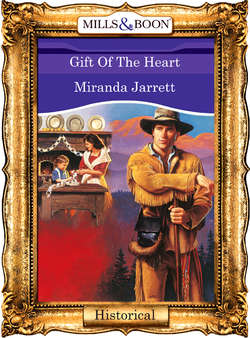Читать книгу Gift Of The Heart - Miranda Jarrett - Страница 8
Prologue
ОглавлениеTryon County, New York
November, 1778
He didn’t want to die alone.
Not like this, not hidden beneath the shadows of the tallest trees, unmourned, unburied save for the drifting snow that would cover his body only until the wolves found him. Or the Senecas. Better the wolves.
Jamie forced himself to take another step, and another, the prints left behind in the snow staggered like a drunkard’s. If Butler’s men were tracking him, they could do it with one eye closed and the other asleep, but Jamie was far past being able to stop them.
The ball from Sergeant Herrick’s pistol had gone clear through his left shoulder, and the wound had seemed clean enough. Jamie was a large man, strong, and he’d survived worse. Because he’d been on the trail with the other Rangers, he had plenty of ground meal and dried beef in his hunting pouch, and as long as he stayed within sight of the Mohawk River to the north, he’d keep his bearings, regardless of the snow.
But by the third day the wound had been clearly festering, and the fever had taken him soon after the snow had begun. Now when he looked down at the rifle in his hands, the barrel iced with a fine line of snow, he couldn’t tell if his fingers shook from the cold or the ague.
But his mother would know the remedy for that, and how to draw the poison from the gunshot wound, too. He would hold the lantern high for her while she stood on a chair to sort through the bundles of dried herbs and barks that hung from the rafters upstairs, clucking her tongue and frowning a little as her long, graceful fingers sought exactly what she’d need.
Then she’d toss the leaves into the little iron pot with the mended leg and simmer them into a draught, or maybe she’d grind and mix them into a poultice. Whichever it was, he’d submit manfully, sitting in the straight-backed bench near the window in the kitchen without flinching or grimacing as an example to his little brother, Sam. Besides, when his shoulder was finally cleaned and bandaged, his mother would reward him with squash pie, not so much a slice of it as a slab, with sweet thickened cream puddled around golden custard on the red earthenware plate.
Somewhere ahead a branch snapped off beneath the weight of the snow, a loud crack in the white silence, and belatedly Jamie’s numbed reflexes took over and he lifted his rifle to his eye. But there was nothing, no Senecas or soldiers or gold squash pie on a red plate, only more bare, black trees against the endless snow.
With a groan of frustration and pain, he once again rubbed his thumb into his eyes. He didn’t want to slip into another fever-dream of home. He couldn’t afford to. Only dying men thought of their mothers and the places they’d lived as boys. After battles he’d heard too many final, garbled recollections from other soldiers to doubt it. He wasn’t going to die, not yet, and he wasn’t going to think of his mother, wiping her hands on her green apron before she smoothed his hair back from his forehead and—
Damnation, it was the fever, that was all! That stone house on the hill wasn’t theirs anymore and hadn’t been for over two years, not since his father had stood up in their Meeting and spoken out against this desolate, destructive war. A Quaker who had counseled peace instead of bloodletting, he had been branded a traitor for his beliefs by the same Congress that promised freedom. The Ryders had lost their house, lost the land that had been in their family for generations. There was no longer an attic filled with pungent, healing herbs, no bench beneath the kitchen window worn smooth by five generations of Ryders, no more of the pie his mother was cutting with the horn-handled knife, the butter crust flaking and crumbling the same way it would on his tongue—no!
Jamie shook his head with desperation, the snow dropping in heavy clots from his hat’s brim. He guessed it was nearly nightfall, and if he didn’t find some sort of shelter, a cave or empty trapper’s hut, he wouldn’t survive until dawn. He didn’t deserve the comfort of memories now. Better to remember why he was running. Better to think of what he’d done and what he hadn’t, of why he’d been shot and why he’d be hung if the soldiers caught him. Or the tall Seneca brave with the feathered scalp lock, the one who’d reached the children first. Better to let the grief and horror of all he’d seen eat at his conscience and sharpen his senses to survive.
God preserve him, he didn’t want to die alone.
